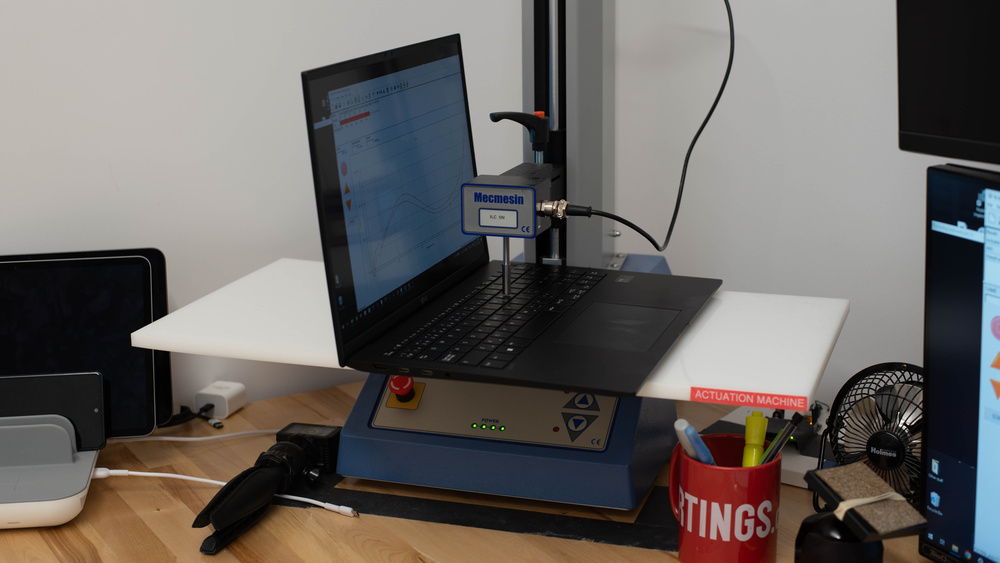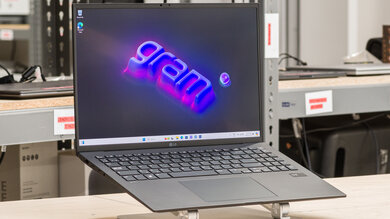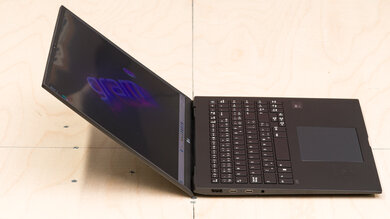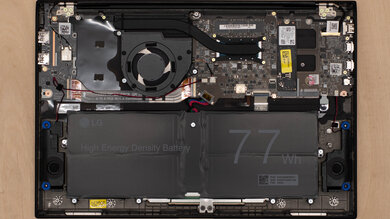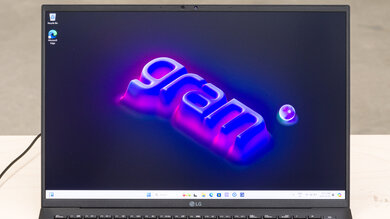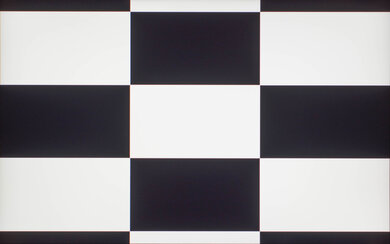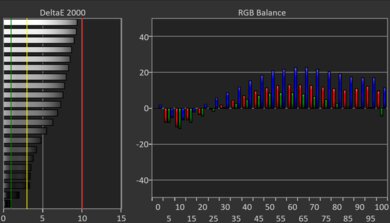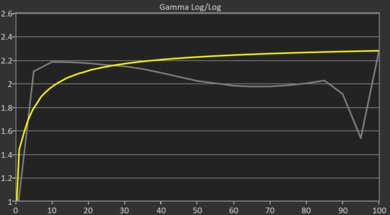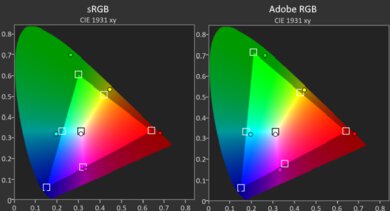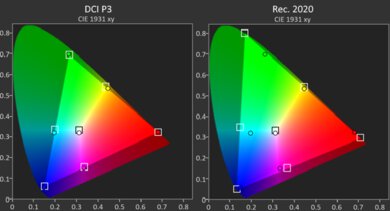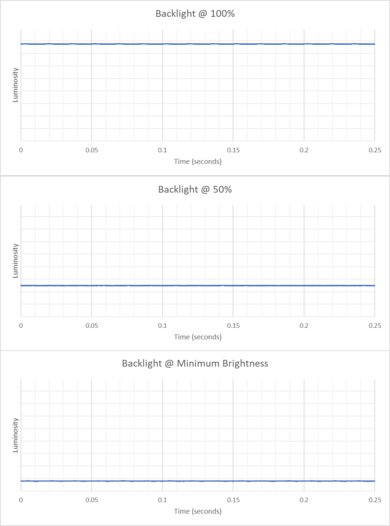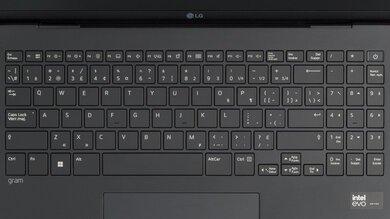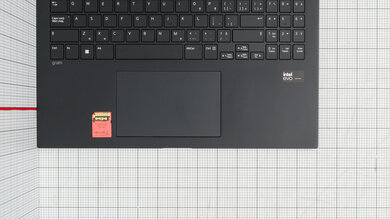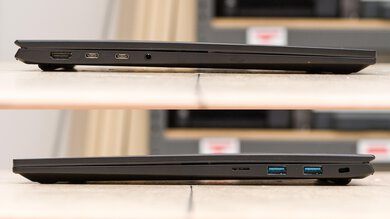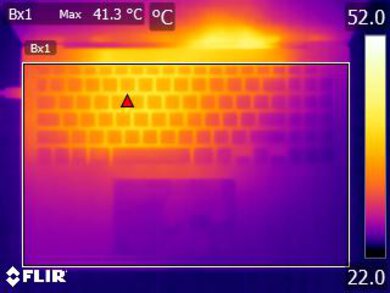Like what we do? We're currently hiring a Staff Writer for Computers. Join our team!
The LG gram 16 (2024) is a Windows ultraportable laptop. It's available with an Intel Core Ultra 5 or Ultra 7 CPU paired with Intel integrated graphics, or Intel Arc integrated graphics, depending on the memory configuration. Memory and storage max out at 32GB and 2TB, respectively. There are three QHD+ IPS panel options: a 60Hz non-touch display, a 60Hz touchscreen display, and a 144Hz non-touch display. All three offer full DCI P3 coverage, and the 144Hz option supports LG's Various Refresh Rate to prolong battery life. It has Wi-Fi 6E wireless connectivity, a 1080p webcam, and a facial recognition IR camera. Ports include two USB-As, two USB-C/Thunderbolt 4s, an HDMI, a MicroSD slot, and a 3.5mm headphone jack.
See our unit's specifications and the available configuration options in the Differences Between Variants section.
Note: In order to better represent real-world usage and the laptop's maximum potential, we've conducted the productivity, gaming, the gaming battery life, and the performance over time benchmarks using the laptop's Performance mode. However, this means that the results aren't directly comparable with previous laptop reviews in which these tests were conducted in the default Balanced mode.
Our Verdict
The LG gram 16 is great for school use. Its thin and light design makes it ideal to carry around, but know that its 16-inch chassis may be too large for some bags. Battery life is where this laptop excels, as it lasts over 15 hours for general productivity tasks like reading articles, text processing, or web browsing. The display is fairly bright, and there's plenty of room for multitasking. For students who need to do color-critical work, like in graphic design, the displays offer full coverage of the DCI-P3 color space. You can do some more intensive things on models with an Intel Core Ultra 7 CPU, such as video editing. The major downside is the build quality: our unit had two defects, including a warped screen, and the laptop is far less sturdy than you'd want on a device made for on-the-go use.
-
All displays offer DCI P3 coverage, making them suitable for color critical work.
-
Outstanding battery life for general productivity use and media consumption.
-
Spacious keyboard and touchpad.
-
Light weight makes it easy carry around.
-
Outstanding port selection, including Thunderbolt 4 ports.
-
Build quality issues on our unit, including a warped display.
The LG gram 16 isn't designed for gaming. While its Intel Core Ultra 7 CPU is quite competent, its iGPU can't handle intensive workloads like gaming. You can likely play some older titles on low settings and 720p, or light puzzle games. As for the display, there's a 144Hz IPS panel, but it doesn't support variable refresh rate to reduce screen tearing. On the upside, it doesn't get hot or loud under load, and there's only minimal performance loss from thermal throttling.
-
User-replaceable storage.
-
Laptop is cool and quiet under load.
-
No discrete GPU options.
-
Displays have slow response time and don't feature variable refresh rate technologies.
The LG gram 16 is decent for multimedia use. Its display gets bright enough for use in all indoor environments, but it will struggle outside in direct sunlight; there's a 144Hz option that gets brighter. Its speakers aren't the loudest or clearest, though, and like most laptops, they lack the necessary bass to provide a full sound. Battery life is this laptop's strength: it lasts over 12 hours for video playback, so you can take a break from your studies or work to watch an episode of your favorite show without worrying about draining the battery.
-
All displays offer DCI P3 coverage, making them suitable for color critical work.
-
Outstanding battery life for general productivity use and media consumption.
-
Light weight makes it easy carry around.
-
Speakers are underwhelming and lack bass.
The LG gram 16 is good for very limited workstation applications. The Intel Core Ultra 7 CPU is fast enough to handle some demanding tasks like video editing and 3D graphics, but like many ultrabooks, this laptop's thermal constraints don't make it the best choice for sustained workloads. Also, you can only get up to 32GB of soldered RAM, which might not be enough for some people. You can do some color-correction work, though, as the available displays have full DCI P3 coverage. The SSD is user-replaceable, and there are tons of ports for peripherals and external displays, including two Thunderbolt 4s and an HDMI.
-
All displays offer DCI P3 coverage, making them suitable for color critical work.
-
User-replaceable storage.
-
Outstanding port selection, including Thunderbolt 4 ports.
-
Laptop is cool and quiet under load.
-
RAM limited to 32GB.
-
No discrete GPU options.
-
Laptop is difficult to open for service due to use of adhesive for feet assembly.
The LG gram 16 is great for business use. It's incredibly thin and light for a 16-inch laptop, and its battery lasts over 15 hours of light use, making it a fantastic option for on-the-go use. It has a large display for split-screen multitasking, a spacious—albeit slightly tiring—full-size keyboard, a responsive touchpad, and a great 1080p webcam. Its Intel Meteor Lake CPU is more than adequate for productivity tasks like text processing, emails, spreadsheets, and presentations. You can even edit photos and videos, which is great for small business owners needing to do a bit of everything. The major downside is the build quality. Our unit came with a warped screen and gaping between the webcam and the display; this doesn't inspire much confidence as to the durability of a device made for on-the-go use.
-
All displays offer DCI P3 coverage, making them suitable for color critical work.
-
Outstanding battery life for general productivity use and media consumption.
-
Spacious keyboard and touchpad.
-
Light weight makes it easy carry around.
-
Outstanding port selection, including Thunderbolt 4 ports.
-
Build quality issues on our unit, including a warped display.
-
Microphone exhibits static, diminishing voice clarity.
-
Laptop is difficult to open for service due to use of adhesive for feet assembly.
- 8.4 School
- 6.3 Gaming
- 7.3 Multimedia
- 8.1 Workstation
- 8.1 Business
Changelog
-
Updated Nov 11, 2024:
Added mention of the Samsung Galaxy Book5 Pro 360 (2024) as an alternative with an OLED display in the Contrast Ratio section.
- Updated Oct 21, 2024: Review published.
- Updated Oct 16, 2024: Early access published.
- Updated Oct 04, 2024: Our testers have started testing this product.
- Updated Oct 02, 2024: The product has arrived in our lab, and our testers will start evaluating it soon.
Differences Between Sizes And Variants
We tested the LG gram 16 (model 16Z90S-G.AA78A9) configured with a QHD+ IPS display, Intel Core Ultra 7 155H, integrated Intel Arc graphics, 16GB of RAM, and 1TB of storage. The display, CPU, GPU, RAM, storage, and color are user-configurable, although the iGPU cannot be configured separately from the CPU; see below for all configuration options:
SCREEN
- 16" IPS 2560 x 1600 60Hz (matte, 350 cd/m², 99% DCI P3)
- 16" IPS 2560 x 1600 60Hz (touch, matte, 320 cd/m², 99% DCI P3)
- 16" IPS 2560 x 1600 144Hz (matte, 400 cd/m², 99% DCI P3)
CPU
- Intel Core Ultra 5 125H (14 cores, 18 Threads, up to 4.5 GHz, 18MB Cache)
- Intel Core Ultra 7 155H (16 cores, 22 Threads, up to 4.8 GHz, 24MB Cache)
GPU
- Integrated Intel graphics (on models with 8GB of RAM)
- Integrated Intel Arc graphics
MEMORY
- 8GB LP-DDR5x 7467MHz
- 16GB LP-DDR5x 7467MHz
- 32GB LP-DDR5x 7467MHz
STORAGE
- 256GB PCIe Gen 4 NVMe SSD
- 512GB PCIe Gen 4 NVMe SSD
- 1TB PCIe Gen 4 NVMe SSD
- 2TB PCIe Gen 4 NVMe SSD
COLOR
- Snow White
- Charcoal Gray
- Obsidian Black
See our unit's label here.
Compared To Other Laptops
The LG gram 16 laptop is a mixed bag. Its build quality is hit and miss, for it feels well-balanced overall, but our unit has two defects: the display is visibly warped, and there are gaping issues on the display assembly around the webcam. Performance is also a bit underwhelming, as this laptop prioritizes thermals over performance. On the bright side (literally), the display is fairly bright and colorful and offers full coverage of the DCI-P3 color space, making it a decent choice for color-critical work. Overall, this laptop feels lacking, particularly for the price point; for example, the Apple MacBook Air 15 (2024) and Microsoft Surface Laptop 7th Edition 15 (2024) provide a more premium user experience and better performance.
See our recommendations for the best business laptops, the best Windows laptops, and the best lightweight laptops.
The LG gram Pro 16 (2024) and the LG gram 16 (2024) represent two tiers from LG's ultraportable product stack. The Pro model is better overall. The Pro model offers much better build quality; despite both models sharing the same design language and using the same magnesium alloy, it's more rigid, feels more durable, and picks up far fewer fingerprints during use. Our non-Pro unit came with a warped display assembly and had issues with gaping around the webcam module. The Pro model also has some options to help with the user experience, like a 2.8k OLED display. In terms of performance, the Pro model performs better despite sharing the same hardware. That said, if you need the longest battery life possible, the non-Pro gram offers vastly superior battery life than the Pro model, coming in at just over 15 hours for light use.
The Microsoft Surface Laptop 7th Edition 15 (2024) and LG gram 16 (2024) are both premium Windows ultraportables. However, the Microsoft device is much better overall. It offers a much more premium user experience. Its all-aluminum chassis is much more rigid, its keyboard and haptic touchpad are easier to use, and its display is sharper, brighter, and more responsive. The Microsoft laptop also has better battery life, but the LG is no slouch here either. The one caveat is the Microsoft device uses the Qualcomm Snapdragon X Elite. This Arm-based SoC is more limited in its use at the moment, as a lot of productivity-based applications need to run through a translation layer for compatibility; in practice, this means they don't perform as well or, in some cases, can't run at all. Check out if your applications are compatible before picking one up.
The Apple MacBook Air 15 (2024) is a much better ultraportable laptop for most people than the LG gram 16 (2024). The Apple offers a premium user experience; its all-aluminum chassis is much better built and rigid, its display is sharper and brighter, and the haptic touchpad is significantly larger despite having less real estate to work with on the smaller deck. Performance-wise, the two laptops trade blows depending on the application. If you need many ports for peripherals and are willing to trade build quality for this convenience, then the LG is the better pick. Its IO layout is much better, including two USB-A, a full HDMI port, as well as support for Thunderbolt 4 on both USB-C ports.
While the Samsung Galaxy Book5 Pro 360 (2024) and the LG gram 16 (2024) are both 16-inch devices, the Samsung is a 2-in-1 convertible, and the LG is a more traditional clamshell laptop. 2-in-1 convertibles are more versatile, but keep in mind that using a 16-inch device as a tablet is a bit cumbersome due to its sheer size. The Samsung also supports pen input, so it's a better option if you like taking handwritten notes or drawing. The overall user experience and performance is pretty similar between these two devices. There's one notable difference: the display. The Samsung has a 120Hz 2.8k OLED panel, which looks nicer than the three IPS panels available on the LG, but know that the OLED flickers, so if you're sensitive to screen flickering, you're probably better off getting the LG.
The LG gram 16 (2024) is the newer and larger sibling to the LG gram 14 (2023). Depending on your use, each laptop has its strengths and weaknesses. Get the gram 14 for on-the-go use. It offers superior build quality, as its chassis is more rigid and durable, and it's more portable since it's a smaller device. While the gram 16 isn't hard to carry around either, as it's incredibly thin and light for a 16-inch model, our model came with a couple of build defects, including a warped display assembly that doesn't inspire too much confidence as to its longevity for on the go use. The larger 16-inch model is better if you need to multitask a lot for your workflow, as the larger display offers much more real-estate for placing windows next to each other. Its battery life is also much better for light use.
Test Results
This laptop is available in Snow White, Charcoal Gray, or Obsidian Black colorways. See the bottom of the laptop.
The LG gram 16's build quality is a bit of a mixed bag. Despite using the same magnesium alloy as the LG gram Pro 16 (2024), this laptop feels much less sturdy than its Pro counterpart. The chassis exhibits noticeable twisting and bending, even when the lid is closed, and its keyboard deck bends when you push down on it. On the bright side, the laptop feels well-balanced, especially for such a lightweight model, and the finish feels durable. The feet are also firmly attached to the bottom of the chassis. The dark color does pick up a lot of fingerprints, though; this likely won't be as noticeable on the gray or white models.
Unfortunately, our model came with two defects. First, the screen is noticeably warped, bowing out from the deck of the chassis when the lid is closed. Second, there's an assembly issue resulting in gaping between the webcam and the display assembly.
The LG gram 16's serviceability is bad. Accessing the internals requires some effort. To gain access to all the screws, you need to remove the feet using a pry tool, as they're firmly attached to the chassis with adhesive; the feet on the LG gram Pro 16 (2024) didn't use adhesive. Disassembly is straightforward after removing the feet. Simply remove nine Philips screws, and use a pry tool to remove the bottom panel of the laptop. Both storage slots support M.2 2280 PCIe Gen 4 NVMe SSDs.
You can access the online manual on LG's website.
The LG gram 16 is available with the following displays:
- 16" IPS 2560 x 1600 60Hz (matte, 350cd/m², 99% DCI P3)
- 16" IPS 2560 x 1600 60Hz (touch, matte, 320 cd/m², 99% DCI P3)
- 16" IPS 2560 x 1600 144Hz (matte, 400 cd/m², 99% DCI P3)
All displays look very sharp and provide plenty of space for split-screen multitasking. Their 16:10 aspect ratio is great for productivity tasks like reading articles or web browsing, as the extra vertical real estate allows you to see more information at once.
The 60Hz non-touch display has a very slow response time, resulting in noticeable ghosting behind fast-moving objects. The 60Hz touch display will likely perform the same, as it has the same refresh rate. Neither of the 60Hz panels supports variable refresh rate technologies to minimize screen tearing while gaming. By contrast, the 144Hz display has a high refresh rate to provide a more responsive desktop experience. While LG advertises the 144Hz panel as supporting VRR, note that this is LG’s Various Refresh Rate, not a variable refresh rate technology like FreeSync or G-Sync. LG's various refresh rate is a power-conservation feature similar to Windows' Dynamic Refresh Rate and Apple's ProMotion. This means it can change the refresh rate (between 33Hz and 144Hz) depending on what you're doing and if you have the laptop plugged in.
The 60Hz non-touch display's contrast is decent and within the typical range for most IPS panels. That said, IPS panels have lower contrast ratios compared to VA or OLED display technologies. As a result, blacks look gray in dim settings. All displays will have similar contrast ratios. Check out the Samsung Galaxy Book5 Pro 360 (2024) if you want a similar laptop with an OLED display.
The 60Hz non-touch display gets bright enough for use in most indoor environments. It'll struggle in very bright environments, though, like outdoors. The touchscreen display will perform slightly worse as it has a lower advertised peak brightness of 320 cd/m², while the 144Hz panel will perform somewhat better and is even suitable for some outdoor use, as it has an advertised brightness of 400 cd/m². The screen gets very dim at the lowest brightness setting, which helps reduce eye strain when viewing content in the dark. All panels should perform similarly for minimum brightness.
The 60Hz non-touch display has good reflection handling. Its matte coating mostly diffuses direct light source across the screen. Viewing bright content is almost entirely reflection free; the brighter 144Hz screen will have no problem with with reflections during bright color content, whereas the dimmer touchscreen display will perform slightly worse. Dark color content is hard to see on all screens.
The 60Hz non-touch display's horizontal viewing angle is okay. The image dims and washes out relatively quickly as you move to the side, so you need to be directly in front of the screen when using the screen for color-critical work. All panels will perform similarly.
The QHD+ IPS non-touch display's vertical viewing angle is okay. Like the horizontal viewing angle, the image dims and washes when viewing from above and below, so you need to look at the screen straight on to see an accurate image. All panels will perform similarly.
The 60Hz non-touch display's accuracy is bad out of the box. The white balance inaccuracies are significant across most brightness levels, resulting in a blue tint. The color temperature is also cool, further contributing to the bluish appearance. As a result of the display's wide color gamut, colors tend to be oversaturated; some people might like this oversaturated look but know it isn't accurate. As for the gamma curve, it's quite far from the target; it's far too low in bright scenes, making them too bright, and it's too high in most dark scenes (except the very darkest), resulting in an image that's too dark.
The LG Smart Assistant app has a few display-related settings meant to optimize the display's performance. Of note is a toggle for Color Temperature Auto Adjustment, which purportedly optimizes the color temperature for the particular display panel, and a Professional Mode, which supposedly lets users access a wider color gamut for content creation work. Neither toggle positively impacts the out-of-the-box color accuracy; rather, they make the display's color temperature even colder than before, deepening the already bluish tint. Here are the color accuracy results and grayscale measurements with the Color Temperature Auto Adjustment setting enabled, as well as the color accuracy results and grayscale measurements using the Professional Mode.
The 60Hz non-touch display's color gamut is outstanding. It has full sRGB and DCI P3 coverage, making it suitable for both SDR and HDR media consumption and content creation. Its Adobe RGB coverage is excellent, though it may not be good enough for professional print photography. All displays should perform similarly as they have the same color gamut.
The LG gram 16 has a good keyboard. It offers a full-sized keyboard, including a numpad, and fits well on the 16-inch chassis. Some may find the typing experience tiring, particularly if they aren't used to such a big keyboard. The keys feel a bit heavy, and there's a fair bit of travel, which can take some getting used to. The keys provide good tactile feedback and have a quiet, albeit satisfying, sound. There's one zone of white backlighting with minimum or maximum brightness settings, or you can turn it off. The backlighting could be brighter to help see the legends through the keycaps.
The LG gram 16 has an excellent touchpad. It's large, smooth, and responsive to all movements and gestures. Palm rejection is okay for the most part, though you might get a few unintentional triggers once in a while. The buttons feel tactile but only work in the bottom half of the touchpad.
The LG gram 16's speakers don't get particularly loud, and there's an obvious lack of bass, particularly when listening to music. Vocal clarity is okay, but because these speakers are quite quiet, dialogue can still be difficult to understand. On the bright side, there's virtually no compression or distortion, even at maximum volume.
The LG gram 16 inch's webcam is decent. Fine details are generally clear, but the image is over-exposed resulting in a bit of a washed out appearance. There's also some noise in the image. While voices sound loud and clear over the microphone, there's significant white noise that detracts from the overall sound quality.
The LG gram 16 has a fantastic port selection. Both USB-A ports support USB 3.2 Gen 2 data transfer speeds of up to 10Gbps. The two USB-C ports support Thunderbolt 4 (up to 40Gbps data transfer speed and two 4k @ 60Hz displays), USB 3.2 Gen 2, and Power Delivery. The latter lets you fast charge the laptop and other PD-compatible devices connected to the port.
The LG gram 16's wireless adapter is an Intel Wi-Fi 6E AX211. Wi-Fi 6E gives you access to the 6GHz band, providing faster speeds, lower latency, and less signal interference than previous wireless standards; however, you need a router that supports Wi-Fi 6E to benefit from these features. If you're looking to upgrade your router for these newer standards, check out our recommendations for the best Wi-Fi routers.
The LG gram 16 is available with the following CPUs:
- Intel Core Ultra 5 125H (14 cores, 18 Threads, up to 4.5 GHz, 18MB Cache)
- Intel Core Ultra 7 155H (16 cores, 22 Threads, up to 4.8 GHz, 24MB Cache)
These are high-performance CPUs from Intel's Meteor Lake family. Like Intel's 14th Gen CPUs, they have a hybrid architecture comprising performance and efficiency cores. However, they have two additional low-power E-cores (LP-E) to further improve efficiency and an NPU (Neural Processing Units) to speed up A.I. tasks, like background-blurring on video calls and image generation in photo editing apps. Generally, these CPUs can handle light productivity tasks and more intensive workloads, like programming, video editing, and 3D graphics. However, these chips aren't the fastest Intel has to offer, as they fall quite a bit behind the 14th Gen HX CPUs, like the Dell Alienware m18 R2 (2024)'s Intel Core i9-14900HX. Regarding core composition, the Core Ultra 5 has four performance cores, eight efficiency cores, and two low-power efficiency cores (4P+8E+2LP-E), while the Core Ultra 7 has six performance cores, eight efficiency cores, and two low-power efficiency cores (6P+8E+2LP-E). Both CPUs have the same Neural Processing Units (NPU).
For more information, see Intel's product brief on their Meteor Lake CPUs.
The LG gram 16 is available with the following two integrated GPUs, which depend upon the memory configuration:
- Intel Arc Graphics
- Intel Graphics (on models with 8GB of RAM)
Both models are low-power graphics processors designed for general productivity tasks like web browsing or video playback. They aren't suitable for intensive workloads like gaming or 3D rendering.
You can configure the LG gram 16 with 8GB, 16GB, or 32GB of RAM. The memory isn't user-replaceable.
You can configure the LG gram Pro with 256GB, 512GB, 1TB or 2TB of storage. The SSD is user-replaceable. There are two slots; both support M.2 2280 PCIe Gen 4 NVMe SSDs.
The LG gram 16 has an outstanding score in Geekbench 5. Its Intel Core Ultra 7 155H performs well in various workloads and can easily handle general productivity tasks like web browsing, text processing, and video playback. You can run more intensive, multi-threaded applications.
In order to exemplify real-world performance, we've run all of our benchmarks using the laptop's Performance mode rather than the default Balanced mode to provide users with a better sense of the laptop's full potential. As a result, the results are not directly comparable to those of our other reviews, which test laptops in their default out-of-the-box settings. Nevertheless, even when using the Performance mode, the iGPU still underperforms compared to models with the same hardware. In practice, the iGPU isn't suitable for intensive workloads; it's designed for general productivity tasks like web browsing and video playback.
While you can do 3D graphics work in Blender on the LG gram 16, it's best to get a laptop with a discrete graphics card if this kind of application comprises the majority of your workflow. Even models with an entry-level NVIDIA GeForce RTX 3050 will provide a smoother experience and render images in significantly less time than using the CPU.
The Basemark GPU score is middling on the LG Gram 16's Intel Arc integrated GPU. This implementation offers performance on par with AMD's Radeon 780M, but it's significantly slower than Apple's base M3 SoC and doesn't even come close to the performance of an entry-level discrete GPU like the NVIDIA GeForce GTX 1650. You can play some light, older games, but only with low graphical settings.
Web browsing and video playback benchmarks use the default Balanced performance mode, while the gaming battery life results use the Performance mode. Models with a 144Hz display will likely have shorter battery life.
We encountered an issue with our unit. The system reports the incorrect time after draining the battery, indicating that the unit may have a defective or dead CMOS battery.
The integrated graphics on all models of the LG gram 16 aren't powerful enough to provide a playable experience in Borderlands 3 and other similar AAA titles. While you can nearly achieve 60 fps on the lowest settings in Borderlands 3, there are far too many stutters and frametime spikes to enjoy the gameplay.
Civilization VI is playable on models with Intel Arc graphics and Intel graphics using medium to low settings. Although there are stutters, they don't make it impossible to enjoy a slow-paced strategy game like this.
Counter-Strike 2 and other competitive FPS titles aren't playable on any variant of this laptop. Even though you can achieve over 60 fps on low settings, there are frequent stutters that prevent you from having the responsive experience that FPS games demand.
Shadow of the Tomb Raider and other similarly demanding titles aren't playable on any variant of the LG gram 16. The gameplay is extremely choppy, even with the lowest graphical settings.
You can change the fan profile via the LG Smart Assistant app. All testing was done using the default Normal profile. While the fans are moderately noisy under load, they aren't distracting. The keyboard gets a little warm under load, but despite the hotspot being at the top of the keyboard, it isn't uncomfortable to use. The bottom of the laptop doesn't get much hotter under load, measuring just 42.2 °C (108 °F).
This test was run using the laptop's Performance mode.
The LG gram 16 has many pre-installed applications, including:
- Dolby Access: Lets you set up and trial Dolby Atmos for Windows.
- Intel Unison: Lets you connect your smartphone to the laptop, allowing you to send and receive messages, view photos on your smartphone, and transfer files, similar to the MyPhone app.
- LG Glance by Mirametrix: Software application that adds attention-sensing capability. When enabled, it can automatically lock your computer when you walk away, pause a video or blur the content when you aren't directly looking at the screen, or move windows from one screen to another.
- LG gram Link: Lets you link your smartphone with the PC. You can use it to transfer files, use your smartphone as a second display, or mirror your phone's content.
- LG On Screen Display 3: Adds an overlay that informs of any changes, like whether Caps Lock is on or off.
- LG PC manuals: User manual.
- LG Security Guard: Monitors suspicious activities when the user is away from the laptop.
- LG Smart Assistant 2.0: Lets you change the fan and power settings, enable dark mode, toggle USB-C offline charging, and enable AI noise canceling.
- LG Update & Recovery: Checks for software and driver updates and backs up data so it can be recovered in case of a problem.
- McAfee: Anti-virus software.
The LG gram 16 2024 has a facial recognition IR camera. You can use it to log into Windows, authorize Windows Store purchases, and auto-fill saved passwords on supported websites.
Comments
LG gram 16 (2024): Main Discussion
Let us know why you want us to review the product here, or encourage others to vote for this product.
This product has been merged with LG Gram 16 Lightweight Laptop, Intel Evo Core Ul. Follow the discussion here.

